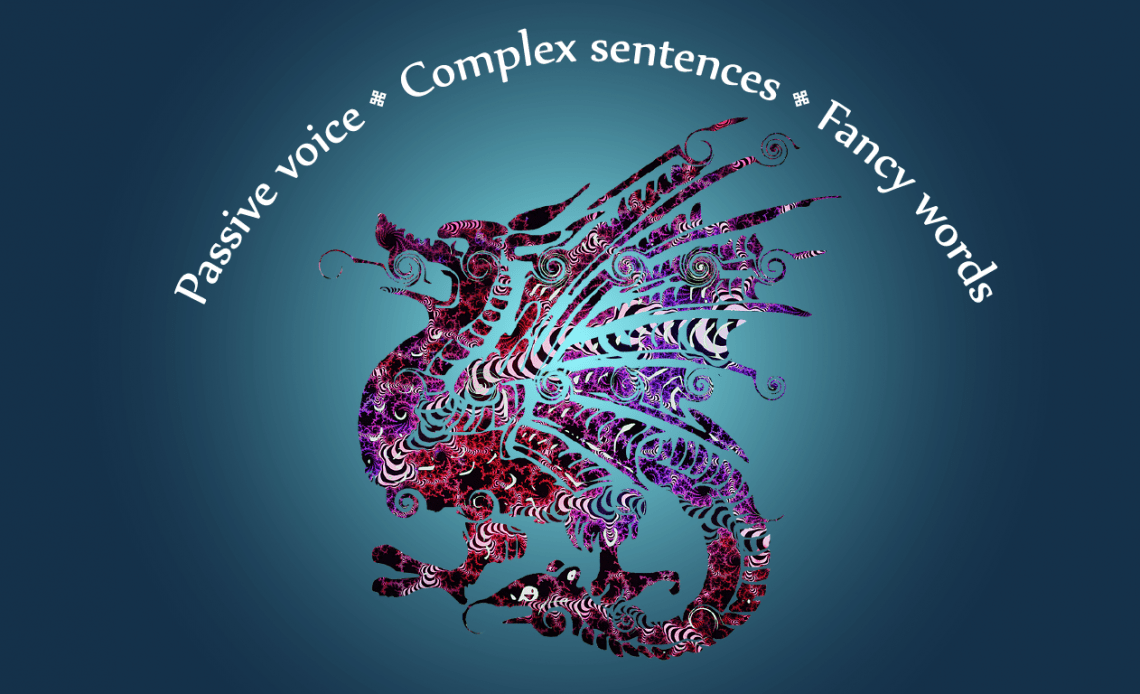Recently updated on March 19, 2024
Disclaimer: This article is for non-native speakers who use English for business. Fellow language enthusiasts, we are going to fight a dragon here. Not a cute dragon, like Toothless, or an awesome and loyal one, like Drogon, but a ruthless and vile creature that wreaks havoc on the Kingdom, burns villages and wants to eat a princess. So brace yourself, sharpen your sword, and do some stretches.
Business English: the Myth
Business English is a strange beast.
If I ask you, what is Business English, you most likely will answer along the lines of, “Business English is being straight to the point, clear, and concise.”
That sounds about right, doesn’t it?
So how do you call sentences that aren’t straight to the point, muddy, and wordy?
Emm, Casual English? Relaxed English? Street English?
Regardless of your answer, something feels off; it doesn’t do justice to the beauty and accuracy of this ancient language. If a person writes a clear and concise sentence, it doesn’t mean it’s Business English. It simply means that the person values brevity and knows how to handle language.
Therefore, for the duration of this article, I want you to treat Business English simply as tactful and laconic English without thinking too hard about all that Business side of the question.
Why so? Because sometimes when we treat Business English as something mythical, we create dragons.
Business English: the Dragon
Business English is a strange beast: sometimes, it has wings, horns, fire breath, and an urge to eat a princess.
Please, look at the following pairs of sentences and tell me which one of the two, A or B, is more “businessy” to you?
A: “The contract is being worked on, and will be sent for you to sign by Friday.”
B: “I will send you the contract to sign by Friday.”
___
A: “We will be happy to assist you in resolving your concern”
B: “We will be happy to help you solve this problem.”
___
A: “Unfortunately, we weren’t able to finish the estimates in time because of the significant workload and unpredictable circumstances.”
B: “Unfortunately, we haven’t finished the estimates yet because the employee got sick.”
If your answer to any of the provided pairs is A, then I’m writing this article for a reason.
Here’s the problem: sometimes, people use the label “Business English” as an excuse to write/say fancy sentences saturated with synonyms from a thesaurus, complicated constructions, and unnecessary passive voice. Such sentences create the dragon that kills the liveliness of the language and makes our thoughts clumsy, redundant, and sometimes difficult to understand. It alienates a writer from the audience.
If you feel like you’ve already got my point, you can go to the bottom of the article and solve a little task in the P.S. section.
I know this issue well because I’ve created the dragons too.

Business English: Fighting the Dragon
We know our enemy, and we need to fight it, strip the dragon of its horns, wings, and fire-breathing ability so it runs away and never returns. Only five swings of our mental sword will help us win.
1. Keep it Simple
For the love of the Language, please, keep your wording simple. No need for fancy words in your casual business communication.
Going back to our sentences:
A: “We will be happy to assist you in resolving your concern”
B: “We will be happy to help you solve this problem.”
Yeah, the first one is definitely more exquisite… on top of being extremely awkward. People don’t talk that way in the real world. The second sentence sounds just fine and smoothly delivers the message. Besides, you can easily use a rare word wrong (“Utilize” I’m looking at you).
Simpler is usually better. Don’t take my word for it: there are plenty of materials on the beauty of simplicity on the Internet.
So, do you want to sound like a down-to-earth human being or as a walking thesaurus?
Also, I have one tip that helps me to avoid out-of-place fancy words and other bad writing habits.
Have you ever read University books that were written for professors rather than students? Most of the time, these books are unbearable to read. It’s easier to swim through a greasy swamp than to get over several pages of such a book. And what is similar between all these writings? You’re right — complex sentences and TONS of odd and fancy words that will make H.P. Lovecraft blush.

Thus, each time you have an urge to use a fancy rare word when a casual word will do, think about those books.
You will gain respect by being honest, providing solutions and support, not by using complex language.
2. Keep it Short
Long sentences hurt readability and cause frustration. Try to keep your sentences short. The UK government suggests 25 words max. I aim at 30 words max (and often fail) because lengthy sentences are my guilty pleasure.
Let’s look at a banal example,
“Our team has discussed your FinTech project idea and determined that it would be optimal to use Java because of the language’s reliability, flexibility, and security capabilities and our experience developing similar applications in Java.”
One sentence, 35 words, and struggle to finish it in one go.
“Our team decided it is best to use Java for your FinTech project. Java is reliable, flexible, and secure while we have experience developing similar applications using it.”
Two sentences, 13 and 15 words respectively, the same message.
Sometimes, we try so hard to sound like fluent English speakers that our sentences come out unnatural and difficult to understand. I sincerely apologize for this cliche, fellow dragon slayers, but “less is more.”
Most likely, you are not Poe and not writing a gothic novel, so better stick with short and sharp.

3. Avoid Vague Adjectives
Vague adjectives undermine your thoughts and weaken the impact of your statements. Avoid them if possible.
Great deal, interesting project, motivated team — without further elaboration, these adjectives are as cliche as they are hollow.
If you claim the project is interesting, give some details.
If you state the deal is great, explain why you think so.
If you have reasons to believe your team is motivated, better list the team’s achievements.
If you want to be persuasive, use adjectives only where they actually TELL a story and not mask the absence of experience.
4. Don’t Hide Behind Vague Explanations
People can feel when you avoid a sensitive matter.
A: “Unfortunately, we weren’t able to finish the estimates in time because of the significant workload and unpredictable circumstances.”
B: “Unfortunately, we haven’t finished the estimates yet because the employee got sick.”
What are those unpredictable circumstances? And how significant a workload could possibly affect the quality of your service?
The second sentence is honest and direct on top of being shorter. Partnerships without transparency are doomed.
5. Avoid Passive Voice
Passive voice, aka the deadly sin of writing, is a pain of many writers. And let me tell you, it doesn’t deserve such a bad reputation. In the right hands, passive voice is an accurate stylistic instrument that makes wonders (Read some Douglas Adams, for example).
However, in Business English, there is rarely a reason to use the passive voice because it makes the sentences wordy and less concise.
Back to our examples:
A: “The contract is being worked on, and will be sent for you to sign by Friday.”
B: “We’re working on the contract. I will send you it to sign by Friday.”
Sentence A is over-the-top formal, wordy, awkward, and has a vibe of exciting manuals that nobody reads. Option B is shorter and straight to the point.
Another bright example of passive voice vagueness is the following cliche:
“Your cooperation is highly appreciated”
It sounds way better to simply write: “We value your partnership/help.”
It has personality and emotion to it.
Passive voice is the dragon’s fire: it can be a light in the darkness but most of the time it burns.
The Master of Horror, Stephen King, experiences some horrors about passive voice too. That’s what he has to say about it in his book “On Writing: A Memoir of the Craft”
The timid fellow writes, “The meeting will be held at seven o’clock”
because that somehow says to him, “Put it this way and people will believe you really know.” Purge this quisling thought! Don’t be a muggle!
Throwback your shoulders, stick out your chin, and put that meeting in charge! Write “The meeting’s at seven.” There, by God! Don’t you feel better?

6. Be Natural
Small talk never killed anybody.
We still prefer people over chatbots for long communication because the former is lively. Therefore, you don’t do yourself a service by trying to appear as formal and devoid of emotions in your communication as possible. Don’t be afraid to sprinkle a bit of personality in your writing when you feel it’s relevant.
I’m not talking a full-scale “What’s up, dude? Hope, you partied hard!” But small talk, sincere advice, a clever word thrown here and there can show a customer that you are not simply doing your work but enjoying the process. People value emotional connection.
Or, it’s crazy but hears me out, even a tactful relevant joke can help resolve the tension or make a client sympathize with you more.
However, always be mindful about the interactions that cross the borders of “formal.”
Business English: Feel the Context
Get ready for the most abstract advice for the most advanced language wielders.
After grammar and style have become a natural continuation of your mental sword, it’s time to pull out the second one, the sword of the instinct. If your experience allows for it, rely on your intuition more to create successful partnerships. No amount of knowledge will help you beat a professional who feels the pain of clients and can prove that he/she can help.
However, never forget that laconism and coherence are virtuous regardless of the circumstances.
Business English is not a fixed medium. It changes as the world of business and people change. However, one thing is constant: Business English is not an excuse to sound smart. It is a tool that helps winning new clients, opportunities, and delivering a smooth customer experience.
Therefore, don’t create new dragons with your writing and speaking. Strive to preserve the liveliness and brevity of the language in each sentence you create. Fluid and refreshing use of the language forges thoughts that are easy to follow and feel.
The Best of Luck to You.
___
P.S. Let’s give our knowledge a try, and slay the dragon hidden in the following letter. This letter is a fruit of the imagination. Any similarities are coincidental.
*****
Hello Mark!
I Hope, everything is okay on your side.
We’ve analyzed the legacy code of the eCommerce project you shared and arrived at the conclusion that it requires some major updates due to the obsolescence of programming practices and glaring security vulnerabilities (including the possibility of SQL injections). Currently, it is impossible to say for certain how many hours it will take to update the code because the estimation is being conducted and will be done by the end of the week. If you have any questions or remarks, share them with us.
Best Regards
*****
Read it carefully and think about what would you change or add to the letter to improve it. (Remember, there is no unіversally correct way of doing it. Simply use your knowledge and follow the gut feeling.) Share your interpretations in the comments.
______
Here’s my rendition (No peeking):
Hello Mark!
Hope you’re having a great day!
Our developers analyzed the legacy project you sent and concluded that it should be rewritten. The code is badly formatted and optimized. Also, the security is non-existent — even SQL injections are possible.
Currently, we are working on the estimates to tell you how much time it will take to rewrite the code. I’ll send you the estimate by Friday. Have a nice evening and be certain that our company will give the project a new life.
If you have any questions, we’d be happy to answer them.
Best Regards.


